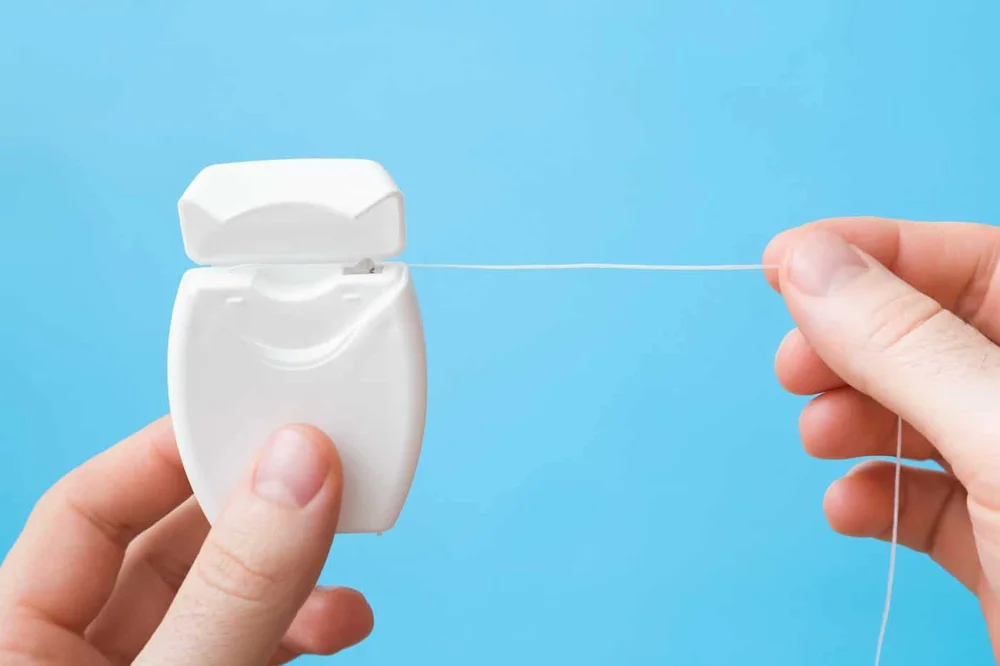Here’s Why Flossing Is So Important For Your Health
How’s your gum health?
Not much of a conversation starter, is it?
It’s actually a very important question, though.
When you think of your health, gums probably aren’t the first thing that comes to mind.
However, the condition of your teeth and gums can have a huge impact on your long-term health and well-being.
Gums 101
Gums are the soft tissue inside the human mouth that covers bone and secures the teeth in place. They create a seal around the teeth to prevent food particles from being lodged between the bone and gum.
Though gum colors vary, typical gum color is described as “coral pink.” Unhealthy gums may appear in patriotic hues: red, white, and blue.
A receding gum line may cause root sensitivity, loose teeth, and other gum issues.
Warning Signs of Bad Gum Health
When plaque builds up along and under the gum line, several issues may occur. The first indication of trouble might be tenderness in the gums or a change in the color of the gums, especially if they turn an angry red. Also, swelling of the gums and frequent bleeding may indicate the build-up of plaque or a gum infection.
Another problem occurs when teeth pull away from the gums, which may allow food particles to pool in abscesses. Over time, these particles decay and create harmful bacteria that can enter your bloodstream through your saliva.
To avoid serious periodontal issues, make a dental appointment right away if you experience any of these gum problems.
Gums and Heart Health
For decades, research has shown a strong correlation between poor oral health (gum or tooth problems) and cardiovascular issues. This could be due to any number of factors including infection caused by bacteria in the mouth. Of course, these issues may also be caused by other poor health choices, such as smoking.
One study in the Journal of Immunology Research, found an association between dental plaque bacteria and coronary problems. The occurrence of heart issues in patients with gum problems was 25-50% higher than in healthy people. This compelling data should provide strong motivation for everyone to brush and floss daily and get regular dental cleanings.
Gums and Memory
A growing body of research, including a study in the Journal of Periodontology, has shown that periodontal (gum) problems are a risk factor for serious cognitive and memory issues. Gum challenges are associated with an unhealthy inflammatory balance, which has been linked to increased risk for long-term memory problems.
The Research
A study found that people who keep their teeth and gums healthy with regular dental health behaviors may have a lower risk of developing memory issues later in life.
Researchers at the University of California followed nearly 5,500 elderly people over an 18-year-period, and found that those who reported brushing their teeth less than once a day were up to 65 percent more likely to develop serious memory problems than those who brushed daily.
The Results
The subjects answered questions about their dental health habits, the condition of their teeth, and if they wore dentures. When the researchers followed up 18 years later, they used interviews, medical records, and in some cases death certificates, to determine that 1,145 of the original group had been diagnosed with serious memory problems.
Of 78 women who said they brushed their teeth less than once a day in 1992, 21 had serious memory problems by 2010, or about one case per 3.7 women. By comparison, among those who brushed at least once a day, one in every 4.5 women developed serious memory problems, which translates to a 65-percent greater memory loss risk among those who didn’t brush daily.
Among the men, the effect was less pronounced with about one in six irregular brushers developing the issues, making them 22 percent more likely to have serious memory problems than those who brushed daily. Statistically, however, the effect was so small it could have been due to chance, the researchers said.
Since good heart and circulatory function is fundamental to good brain function, it’s always a good idea to practice good dental hygiene for whole-body health.

Benefits of Flossing
Flossing is a cornerstone of dental hygiene. According to the American Dental Association (ADA), using dental floss can help remove plaque from areas a toothbrush can’t reach.
Aside from making your gums look and feel healthy, flossing helps:
- remove plaque
- reduce bad breath (halitosis)
- protect against tooth decay
- lessen serious gum problems and eventual loss of teeth
Types of Floss
The two main types of dental floss are waxed and unwaxed. The ADA reports that both are effective at removing plaque and other debris, so choosing a type of floss is really a matter of personal preference. Waxed floss may be helpful for those with tight spaces between their teeth.
Dental floss also comes in different flavors, such as mint or cinnamon. Those with bridges, braces, or gaps may try a super floss, interdental brushes, or electric flossers. People with braces, sensitive gums, or children under 5-7 years of age, may require specialized flossing options.
Consult with a dentist for the best flossing practice for you or a family member.
Brushing Tips
The ADA recommends brushing your teeth for two minutes twice a day. Best practices for brushing include:
- using a soft toothbrush
- brushing with a gentle circular motion
- remembering to brush your tongue
- reducing germs by using a natural mouthwash
- replacing your toothbrush every 3 to 4 months
- visiting your dentist at least twice a year for checkups and cleanings
Become Chums with Your Gums
Oral health is extremely important to your overall health. You can’t have a healthy mouth without healthy gums.
The best way to ensure healthy gums is to brush your teeth after every meal and floss at least once daily. Some prefer to floss first thing in the morning; others like a thorough cleaning before they go to bed. Either way is fine, but doing both is recommended for even greater benefit.
It’s recommended that you floss before you brush your teeth. Flossing helps loosen food particles and plaque, and brushing removes that debris from your teeth and gums.
Some may consider flossing as optional, but it’s absolutely vital to tooth/gum health and overall wellness. Since it may help lessen the risk of memory problems, flossing is also a brain-healthy exercise.
Remember, a brilliant smile begins with clean teeth and healthy gums!
At BrainMD, we’re dedicated to providing the highest purity nutrients so you can do the things you love. For more information about our full list of brain healthy supplements, please visit us at BrainMD.
- This Is What You Need to Know About HBOT
Medically Reviewed by Dr. Nicole Avena - April 22, 2024 - Hormone Changes in Men: How to Know If You Have Low Testosterone! - April 15, 2024
- This Is What You Need to Know About EMDR Therapy! - April 11, 2024




I’m a Registered Drntal Hygienist with over 35 years of experience.
This is generally a very good article.
My concerns are:
The title is about flossing- flossing is not the be all/end all for periodontal health.
It’s about both bacterial plaque and biofilm.
*The large majority of people can keep their gums healthier with a quality, power toothbrush.
*Many people do better with an interproximsl brush than floss, and some even with a WaterPik.
*Once a day brushing isn’t sufficient for anyone, as plaque older than 12 hours contains significantly more of the most destructive bacteria.
*it’s critical to follow your Hygienist’s/Dentists recommendations for your necessary cleaning intervals.
The “Six Month” prophy tradition was based on an early toothpaste manufacturer, that determined their TUBE of paste would last an average of six months.
Many need to be seen every 3-4 months, such as:
*Those with a history of periodontal disease
*People with many chronic health conditions, that could go down hill very rapidly (people with Diabetes, heart patients, pregnant women, others with Autoimmune conditions, etc.)
*M